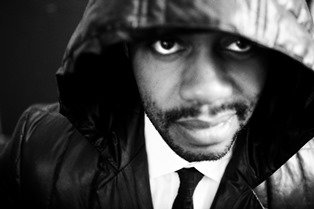
Prologue
Mitchell S. Jackson wants you to focus on his craft. So much so that he tells readers how the story is going to end before the first chapter in his debut novel "The Residue Years."
"That's why I put the prologue at the beginning of the book saying this guy is going to go to prison," says the author. "I'm taking that away from you right from the jump so now what's your reason for reading?"
Jackson's evolution has taken him from dreams of being a news anchor to writing for national publications to teaching writing in New York. As he awaits another milestone in his career, he discusses his new book and the journey that got him to this point.
"The Residue Years"
"The Residue Years" is a work of fiction but it's also autobiographical. It switches perspectives between a young man named Champ and his drug addicted mother, Grace. Fresh out of rehab, Grace is trying to stay clean and get her kids back while Champ tries to reclaim the home their family once shared. Faced with few options, he gets caught up in the world of selling crack.
Jackson, who served 16 months for drug dealing (and says he very well could've served more), knows that the content is "familiar" so he focuses on literary techniques to make it fresh.
The goal is that his story won't be marginalized as just another "story about a Black guy by this Black guy about being Black."
Writing the novel has been an uphill struggle.
"The Residue Years" was a story he wanted to tell since before he became he a writer.
After eight years of writing, he took the book to his mentor who suggested he scrap the idea.
Documentary Jackson has been at work on an accompanying documentary for "The Residue Years." |
"To be honest, it wasn't a novel when I gave it to him," says Jackson. "It was some episodes. It was some chapters but it didn't have the narrative thrust a good novel should have."
In his mentor's class, students were instructed to do one of two things when this happens. Either start over or keep working until it becomes the piece you want it to be. He chose the latter and used the rejection as motivation.
The rewriting process took many drafts. Jackson says he did three or four alone for Bloomsbury, his publisher, within the last year and a half.
"It took so long for me to do it and there were moments where I didn't feel so strong—that I would be able to make it," he says. "It's not that I didn't feel I would be able to finish. I was determined to finish but I wanted to make sure it was something I'd be proud of."
Evolution as a Writer
"The Residue Years" is the culmination of nearly a decade of writing and Jackson has been busy broadening his craft in other fields throughout the process.
After graduating from Portland State University he took an internship at KOIN and then worked as an associate producer at KATU. His goal was to become a news anchor.
 During that time, he became disillusioned. Jackson didn't want to compromise his identity and decided to go to grad school at PSU.
During that time, he became disillusioned. Jackson didn't want to compromise his identity and decided to go to grad school at PSU.
Although he liked journalism, he was more beholden to long form feature writing. One of his first published pieces, which appeared in the Portland Tribune, was called "Almost Famous." It told the story of his basketball playing peers who didn't make it to the pros.
After getting his Master's in writing from PSU, Jackson moved to New York where he got his M.F.A. from New York University.
As a newcomer, he would go to parties and introduce himself to magazine personalities he recognized. This got his foot in the door with publications like King Magazine, Vibe and The Source.
Jackson didn't take the traditional route of pitching a story and querying an editor. Instead, he focused on meeting people and building relationships.
In addition to feature journalism, Jackson did fiction and poetry, which has won awards and appeared in literary journals.
Now he teaches writing at NYU, Medgar Evers College and John Jay College.
Grounded in Fiction
Versatility is the key to a career in writing, he says.
"My favorite writer is James Baldwin," says Jackson. "My favorite living writer is somewhere between John Edgar Wideman and Junot Diaz and all those guys do fiction and nonfiction. I feel like if you can't do nonfiction, you might be kind of weak as a writer."
With his broad base of writing work, fiction is still Jackson's ground base. You can do anything with fiction, he says.
"If you were never good at letter writing, you could write a novel in letters. It gives you the skill set to be strong in the other areas. Storytelling and creating a scene and description, I've always thought the strength of those comes from being able to write fiction."
 With the release of his debut novel, Jackson hopes to put that on full display to the literary world.
With the release of his debut novel, Jackson hopes to put that on full display to the literary world.
It was an apprenticeship when he first started, he says. He would read other authors and pick and choose techniques he liked until he finally settled on first person narrative, his strongest voice.
The finished product incorporates tools like meta-fiction, or stepping outside of the narrative to speak to the reader, all while switching back and forth between perspectives.
Jackson is perhaps, most proud of his use of language.
"One thing that I really, really work hard at is sentence making," he says. "All the writers that I like, they're about creating beautiful sentences. Not beautiful in the sense that I'm talking about butterflies and all that but just interesting, sonically appealing sentences."
"The Residue Years" will be in stores Aug. 20. Jackson will be reading from the novel at Powell's City of Books on Burnside on Sep. 13 at 7:30 p.m.














































































































































































































































































































